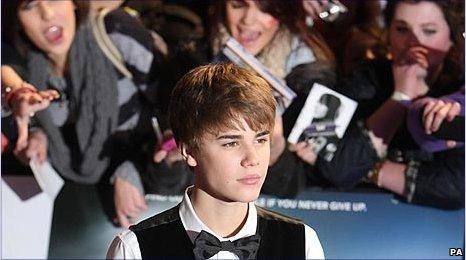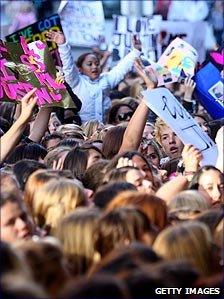Justin Bieber: Why the fuss?
- Published

Bieber is just 16 years old
Teen sensation Justin Bieber caused an outbreak of classic pop hysteria in the UK this week, but where did he come from and what's all the fuss about?
You may have been able to hear the screaming - even if you weren't in London. Teen pop star Justin Bieber was in town this week to launch his first film, Never Say Never, and several thousand girls were there to greet, scream and cry at him.
It seems that over the course of 18 months he has emerged from nowhere to take over the pop world. Young girls, in particular, will tell you the name of his dog (Sam) and his favourite colour (purple). But others can't understand what the fuss is about.
Bieber was born in the small town of Stratford in Ontario, Canada, in March 1994. His rise from there is a modern fable.
He taught himself to play guitar and drums. His single mother started posting videos of him on YouTube when he was 12, singing at local talent shows. They were spotted by chance by a manager, who then successfully touted the boy to the R'n'B giant, Usher. Just like that, Bieber became a sensation.
'Beliebers'
The benchmarks by which we measure his success are thoroughly 21st Century. His videos are among the most watched on YouTube, and his name is one of the most popular search terms on websites such as Google and Ask Jeeves.
Bieber has 7.3 million followers on Twitter, well ahead of the old guard such as Ashton Kutcher, though still slightly behind Lady Gaga. He has more than 21 million friends on Facebook. His fans call themselves "Beliebers".
Lauren Franklin from the youth website, Sugarscape, has no doubt that his use of social media is key to his connection with his young fans.
"Part of the hysteria is that girls can stalk him because he is on Twitter all the time, if he's feeling ill he'll tweet about it," she says.
"For the fans, it's like he's sending them text messages all the time. Teenage girls who like someone will try and hunt them down as much as they can, and they can just get so much of Justin Bieber."
Franklin met Bieber on Wednesday at his film premiere, and was won over.
"He's confident, he's charming, he's very funny. He's basically the ultimate pop star. He's clean, but not cheesy."
He has succeeded by conventional measures too. On Tuesday night he won International Breakthrough Act at the Brit Awards, and last year he became the youngest singer to top the American Billboard Charts since Stevie Wonder in 1963.
Hackers
Peter Robinson, from the pop commentary website, PopJustice, says while Justin Bieber might seem to be just another baby-faced singer, his emergence from YouTube is proof of the changes in the music industry and the wider world.
"Five or six years ago there was no direct link between an artist and the fans," he says. "There was always mediation by a journalist, or a DJ, some sort of gatekeeper. There is now a completely direct route. Even parents are taken out of the equation too."

Bieber fans are called Beliebers
He says the lessons of Bieber's success are already being learned by the music business.
"Record label talent scouts do look at YouTube. If you want a pop icon for your roster then trawling the clubs of Camden isn't the way to do it any more."
Of course, whatever lifts you up can also drag you down, and Bieber has been the target of more than his fair share of online venom. Hackers targeted his videos on YouTube with abusive comments about him appearing beneath the clips. Attempts were also made to rig internet searches to link his name to syphilis.
As interest in everything about him has grown, from his views on haircuts to politics and social issues, he has also learnt to be very careful about what he says.
There was, appropriately, a buzz of interest on Twitter when he told Rolling Stone magazine in a new interview that he "really doesn't believe in abortion".
And now he is on top of the world, questions are being asked about when a new star will emerge.
Tom Payne, the author of Fame: from the Bronze Age to Britney, sees parallels from history.
"The new and the fresh has always been important, and everything has a shelf life. People can only be entertained for so long. YouTube is now the way of facilitating the search for something new. We can reshuffle our iPod, get rid of Justin Bieber, and replace him with something else."
The singer himself seems to brush off all the hysteria. At a recent news conference, he addressed the issue of world domination with a twinkle in his eye: "There is no cure," he said. "For Bieber fever."